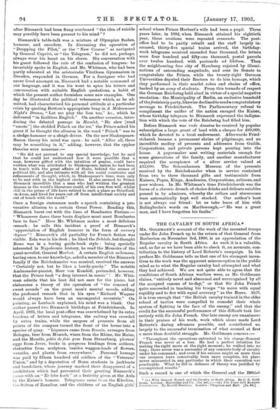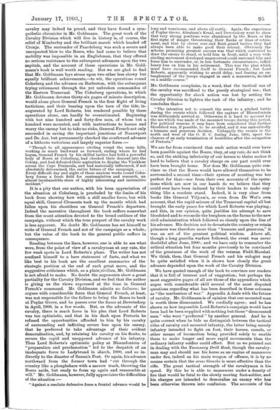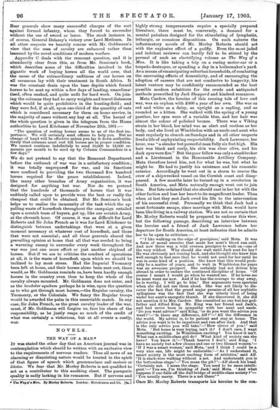THE CAVALRY IN SOUTH AFRICA.*
Mn. GOLDMANN'S account of the work of the mounted troops under Sir John French up to the return of that General from
Barberton on November 3rd, 1900, is an appreciation of the Regular cavalry in South Africa. As such it is a valuable, and, as far as we have been able to check it, an accurate, con- tribution to the history of Lord Roberts's campaign. In his preface Mr. Goldmann tells us that one of his strongest incen- tives to the work was the apparent misconception in the public mind as to what the Regular cavalry had attempted and what they had achieved. We are not quite able to agree that the conditions of South African warfare were, as Mr. Goldmann claims, "entirely novel and abnormal and unrecognised by all the accepted canons of to-day," or that Sir John French quite succeeded in teaching his troops "to move with equal rapidity and to fire with equal accuracy" as the Boers. Still, it is true enough that "the British cavalry trained in the older school of tactics were compelled to remodel their whole system of fighting in the face of the enemy," and that the credit for the successful performance of this difficult task lies entirely with Sir John French. Our late enemy are unanimous in their praises of his work, work which alone made Lord Roberts's daring advances possible, and contributed so, largely to the successful termination of what seemed at first a more than doubtful struggle. Mr. Goldm.ann concurs :— " Throughout the operations entrusted to his charge General French was never at a loss. He had a perfect intuition for making the right move at the right moment; he walked into no trap ; there never was a surrender of any concrete body of cavalry under his command; and even if his success might on more than one occasion have conceivably been more complete, his plans never miscarried in any particular in which their execution was practicable. What he did in defiance of theory was justified by accomplished results."
Such a record is one of which the General and the Btitish
* (1.) With Gsnaral Preach and his Cavalry in South Africa. C. S. Gold.
mann. London : Macmillan and Co. I 15s. net.I—(2.) Two Years with Remount Commissions. By Harold Sessions. London Chapman and Hall. as. sa.). ,
cavalry may indeed be proud, and they have found a sym- pathetic chronicler in Mr. Goldmann. The great work of the ,Cavalry Division which will live in history is, of course, the relief of Kimberley and the brilliant march which headed off Cronje. The surrender of Paardeberg was such a severe and unexpected blow to the Boers, who had come to believe that mobility was impossible in an Englishman, that they offered no serious resistance to the subsequent advances upon the two capitals, and the account of these operations in Mr. Gold- in/MIA book is well worth reading. But we are glad to find that Mr. Goldmann lays stress upon two other less showy but equally brilliant achievements,—to wit, the operations round Colesberg and the advance on Barberton, with the subsequent trying retirement through the yet unbroken commandos of the Eastern Transvaal. The Colesberg operations, to which Mr. Goldmann devotes thirty-six pages of minute description, would alone place General French in the first flight of living tacticians, and their bearing upon the turn of the tide, in- augurated by Lord Roberts, but rendered possible by these operations alone, can hardly be overestimated. Beginning with but nine hundred and forty-five men, of whom but a hundred were mounted, and with instructions to harass and worry the enemy but to take no risks, General French not only succeeded in saving the important junctions of Naauwport and De Aar, but permanently checked the southward advance of a hitherto victorious and largely superior force :—
"Though to all appearances circling round the same hills, working as much backward as forward, ending where he had begun, General French by his skilful tactics had held a powerful body of Boers at Colesberg, had checked their descent into the Colony, and had defeated their aspiration to display the Vierkleur across the Cape Peninsula, and had materially influenced, if not
absolutely determined, the entire future of the campaign Every difficult day and night of those anxious weeks round Coles- berg forms a fresh field for contemplation and research, an almost inexhaustible store of highly interesting and instructive incident."
It is a pity that our author, with his keen appreciation of the situation at Colesberg, is precluded by the limits of his book from showing how with a still smaller force, but with
equal skill, General Clements took up the mantle which had fallen upon his shoulders on General French's departure. Indeed the narrative throughout the book suffers somewhat from the scant attention devoted to the broad outlines of the campaign, without which the true purport of the cavalry work is less apparent. No doubt Mr. Goldmann has set himself to write of General French and not of the campaign as a whole ; but the value of the book to the general public suffers in consequence.
Reading between the lines, however, one is able to see what were, from the point of view of a cavalryman at any rate, the few weak spots in Lord Roberts's plans. The writer has not confined himself to a bare statement of facts, and what we like best in his book are the excellent summaries of the strategic position at the end of each great move, and the suggestive criticisms which, as a plain:civilian, Mr. Goldmann is not afraid to make. No doubt the arguments show a great partiality for the Cavalry Division, and we feel that the author
is giving us the -views expressed at the time in General French's command. Mr. Goldmann admits no failures; he
argues with considerable force that General French, at least, was not responsible for the failure to bring the Boers to book at Poplar Grove, and he passes over the fiasco at Dewetsdorp in April, 1900, in a few words. But, as the advocate of the cavalry, there is much force in his plea that Lord Roberts was too optimistic, and that in his dash upon Pretoria he refused the opportunities afforded to him by his cavalry of surrounding and inflicting severe loss upon his enemy,
that he preferred to take advantage of their evident demoralisation,, and, by retaining his cavalry on his flanks, to secure the rapid and unopposed advance of his infantry.
Thus Lord Roberts's optimistic policy at Bloemfontein of "preparation and proclamation" led to the despatch of an inadequate force to Ladybrand in March, 1900, and so in- directly to the disaster of Sanna's Post. Or again, his advance northward from the former town had "cut through the country like a ploughshare with a narrow track, throwing the Boers aside, but ready to form up again and reassemble at will." Mr. Goldmann, however, fully appreciates the difficulties of the situation :—
"Against a resolute defensive force a frontal advance would be long and wearisome, and above all costly. Again, the experience of Poplar Grove, Abraham's Kraal, and Dewetsdorp went to show that very strong positions were abandoned by the Boers at the first signs of danger threatening their flanks or lines of retire- ment, and that by clever rear and flank guard tactics they had always been able to make good their retreat. Obviously the scheme promising greatest success was that which contrived to draw the enemy to stand, or hold him in front, until a very wide circling movement developed unperceived could surround him and force him to surrender, or, in less fortunate circumstances, inflict heavy loss on him in his retirement. This was the plan which must have recommended itself to General French ; but Lord Roberts, apparently wishing to avoid delay, and fearing an en- tanglement of the troops engaged in such a manoeuvre, decided on a middle course."
Mr. Goldmann complains, in a word, that the tactical use of the cavalry was sacrificed to the purely strategical use ; that the opportunity for shock action was lost by setting the Cavalry Division to lighten the task of the infantry; and he concludes that— "The intention not to commit the army to a pitched battle during the events which followed the capture of Bloemfontein was deliberately arrived at. Otherwise it is hard to account for the use which was made of the mounted troops durinr, this period. For political reasons it may have been considered that further bloodshed was, if possible, to be avoided, and it was undoubtedly a humane and generous decision. Unhappily the events in the north and west of the 0. R. C. during June, 1900, upset the chances of an early termination of hostilities after the occupation of Pretoria."
We are far from convinced that such action would ever have
been possible against the Boers; they, at any rate, do not think so, and the striking inferiority of our horses to theirs makes it hard to believe that a cavalry charge on our part could ever have been brought home. Nor does Mr. Goldmann quite con- vince us that the Boers would have allowed themselves to be surrounded a second time—their system of scouting was too perfect for that—nor from their own accounts of the opera- tions which are now in our hands do we believe that they could ever have been induced by their leaders to make any- thing like a resolute stand. Indeed, it is very clear from books like General Viljoen's, or even from De Wet's own account, that the rapid seizure of the Transvaal capital all but brought the early peace for which Lord Roberts was playing; and this, in our opinion, quite justifies his attempt to save bloodshed and to reconcile the burghers on the farms to the new civil administration which followed so closely upon the line of his advance. His decision not to devastate the country or retain prisoners was therefore more than "humane and generous," it was an act of the greatest political wisdom. Above all, though a long guerilla warfare followed, the event was never doubtful after June, 1900; and we have only to remember the critical situation but four months previously to be convinced of the greatness of the work of the veteran Field-Marshal. We think, then, that General French and his eulogist may be quite satisfied when it is shown how closely the great advance depended upon the work of the Cavalry Division.
We have quoted enough of the book to convince our readers that it is full of interest and of suggestion; but perhaps the most suggestive pages of all are those of the appendices which
argue with considerable skill several of the most disputed questions regarding what has been described in these columns as "the mechanism of war." Appendix A deals with the future of cavalry. Mr. Goldmann is of opinion that one mounted man is worth three dismounted. We cordially agree; and he has shown us how impossible Lord Roberts's campaign would have been had be been supplied with nothing but those "dismounted men" who were " preferred " by another general. And he is quite correct when he bids us distinguish between the tactical
roles of cavalry and mounted infantry, the latter being merely infantry intended to fight on foot, their horses, camels, or other means of locomotion being provided solely to enable them to make longer and more rapid movements than the ordinary infantry soldier could effect. But as we pointed out in dealing with the Yeomanry Drill Book, though the cavalry-
man may and should use his horse as an engine of manoeuvre under fire, indeed as his main weapon of offence, it is by no
means certain that the arme blanche is more effective than the rifle. The great tactical strength of the cavalryman is his speed. By this he is able to manoeuvre under a density of fire that would be fatal to the slowly moving foot-soldier, and his charges are intended to demoralise an enemy who has been otherwise thrown into confusion. The accounts of the
Boer generals show many successful charges of the sort against formed infantry, whom they forced to surrender without the use of sword or lance. The stock instance is, of course, General Delarey's victory over Lord Methuen. In all other respects we heartily concur with Mr. Goldinann's view that the uses of cavalry are enhanced rather than lessened by the novel conditions of modern warfare.
Appendix C deals with the remount question, and it is abundantly clear from this, as from Mr. Sessions's book, which describes some of the difficulties involved in the gigantic work of buying horses all the world over, that the cause of the extraordinary unfitness of our horses on all occasions lay with their treatment in South Africa. It was the constant drain upon the base depots which forced horses to be sent up within a few days of landing, unacclima- timed, often unshod, and quite unfit for hard work. On join- ing the columns they had to carry weights and travel distances which would be quite prohibitive in the hunting-field ; and they were fed, if at all, upon one-third of the quantity of oats which is considered necessary for them on home service, in the majority of cases without any hay at all. The kernel of the whole question is given in the telegram from the Home authorities to Lord Kitchener of November 26th, 1901 :—
" The question of resting horses seems to us of the first im- portance. We will certainly send officers to help you. But no change of hand will be effective unless you lay it down authorita- tively that columns must rest till horses are in proper condition. We cannot continue indefinitely to send 10,000 to 12,000 re- mounts per month to be used up by Column Commanders in a few days."
We do not pretend to say that the Remount Department before the outbreak of war was in a satisfactory condition ; it was totally unprepared for war, and its functions were confined to providing the two thousand five hundred horses required for the peace establishment. Indeed, like many other branches of Army organisation, it was designed for anything but war. Nor do we pretend that the hundreds of thousands of horses that it was suddenly called upon to provide were the best or really the cheapest that could be obtained. But Mr. Sessions's book helps us to realise the immensity of the task which the ap- palling waste of horseflesh throughout the campaign entailed upon a scratch team of buyers, got up, like our scratch Army, at the eleventh hour. Of course, it was as difficult for Lord Roberts and Sir John French as it was for Lord Kitchener to distinguish between undertakings that were at a given moment necessary at whatever cost of horseflesh, and those that were not essential; and all these generals shared the prevailing opinion at home that all that was needed to bring a wavering enemy to surrender every week throughout the war was just one more effort or just another shipload of horses. But if we are to criticise the conduct of operations at all, it is the waste of horseflesh upon which we should be inclined to lay most stress. Had the Imperial Yeomanry been left at home, and their horses alone been sent out, there would, as Mr. Goldmann reminds us, have been hardly enough hones in the country even then to keep the whole of the cavalry always mounted. Mr. Goldmann does not enter, and as the laudator equitum perhaps he is wise, upon the question as to who got through most horses,—the Regular cavalry, the Yeomanry, or the Colonials. We fancy the Regular troops would be awarded the palm in this unenviable match. In any case, Sir John French, as the great cavalry leader of the war, must, if Mr. Goldmann will forgive us, face his share of the responsibility, as he justly reaps so much of the credit of what was certainly a victorious, but at all events a costly, war.












































 Previous page
Previous page